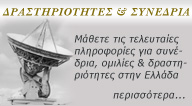| |
|
|
|
| Ενημερωτικό Δελτίο 300 - Φεβρουάριος 2023 |
| FEBRUARY 2023 - TOPICS |
| |
- Short News
- The 16th Conference of Hel.A.S.
- Monthly Colloquium of Hel.A.S.
- Upcoming Astronomy Meetings in Greece
- About this Newsletter
|
| 1. Short News |
|
We would like to congratulate Dr. Konstantina Anastasopoulou who has recently moved to a postdoctoral position at the INAF-Osservatorio Astronomico di Palermo, in Palermo, Italy. The Society extends its best wishes for further success in her professional pursuits.
We would like to congratulate Dr. Zhuleku Juxhin who has recently moved to a postdoctoral position at the Department of Physics of the University of Ioannina, Greece. The Society extends its best wishes for further success in his professional pursuits.
We would like to congratulate Dr. Alceste Bonanos who has recently promoted to Research Director at IAASARS/NOA. The Society extends its best wishes for further success in her professional pursuits.
We would like to congratulate Dr. Leo Gkouvelis who has recently moved to a long term faculty position at the University Observatory Munich of the the Ludwig-Maximilians-University in Germany. The Society extends its best wishes for further success in his professional pursuits.
|
| |
| 2. The 16th Conference of Hel.A.S. |
|
We would like to inform all members that the registration and abstract submission for the 16th Conference of HelAS is open. All members are encouraged to visit the web site of the conference at: https://helas.gr/conf/2023
|
| |
| 3. Monthly Colloquium of Hel.A.S. |
|
We are happy to announce that the February 2023 colloquium speaker is Dr. Eftyhia Zesta. As usual, videos of all past colloquia are available in the Youtube channel of the Society. Details of the upcoming colloquium follow:
23rd Monthly Colloquium of HelAS - 10 January 2023
"Heating and Cooling of the thermosphere during geomagnetic storms, impact on satellite orbital drag and the new Geospace Dynamics Constellation mission"
by
Dr. Eftyhia Zesta, NASA/GSFC, USA
Tuesday, 14 February 2023 at 15:00 Athens time (UTC + 2:00)
Click for ZOOM link
(Meeting ID: 869 9909 6406 and Passcode: 691198)
Abstract: Magnetic storms cause upper atmosphere heating and neutral density upwelling. Enhanced density levels increase air drag forces on low-Earth orbit (LEO) satellites, which in turn affect their acceleration leading to altitude losses, lifetime reduction, and orbital tracking uncertainties. Many recent studies have shown that, along with thermosphere heating and its subsequent upwelling, large amounts of Nitric Oxide (NO) molecules are produced particularly during severe and extreme events. NO plays a major role in thermosphere dynamics because it acts as a cooling agent in the thermosphere by irradiating heat back into space. We study the global thermosphere response to storms by means of superposed epoch analysis of the thermosphere mass density response based on data from the CHAMP, and GRACE LEO satellites for the period of September 2001 to 2020. We use NO observations by the Sounding of the Atmosphere using Broadband Emission Radiometry (SABER) instrument onboard NASA’s Thermosphere Ionosphere Mesosphere Energetic Dynamics (TIMED) satellite to uncover the role NO plays in the faster cooling of more intense storms. We find that storms with the most extreme heating are the fastest to cool off during the storm recovery phase. These responses are not predicted by our current models, leading to large errors in in-track predictions of LEO satellites. The new Geospace Dynamics Constellation (GDC) mission, currently in Phase A, will be a constellation of six satellites that in different orbital configurations during its lifetime will study the responses of the upper atmosphere to energy input from the magnetosphere as well as its subsequent internal reconfiguration processes. GDC follows and greatly enhances the CHAMP, GRACE and SWARM missions. We will discuss the two selected instruments that will provide the magnetospheric energy inputs for the GDC mission: the Comprehensive Auroral Precipitation Experiment (CAPE) and the Near Earth Magnetometer Instrument in a Small Integrated System (NEMISIS) investigations.
|
|
| |
| 4. Upcoming Astronomy Meetings in Greece |
|
|
| |
| 5. About this Newsletter |
|
This Newsletter was sent to all members of Hel.A.S. who have e-mail access. The next edition of the Newsletter will be mailed around March 1, 2023. Please send your announcements (e.g., appointments / departures, job openings, research opportunities, awards, conferences in Greece) or comments before February 25, 2023. If you do not wish to receive future issues of this Newsletter or the e-mail address to which it was sent is not your preferred one, please inform the Secretary of Hel.A.S. at secretary@helas.gr.
|
|
|
|
|
 |








